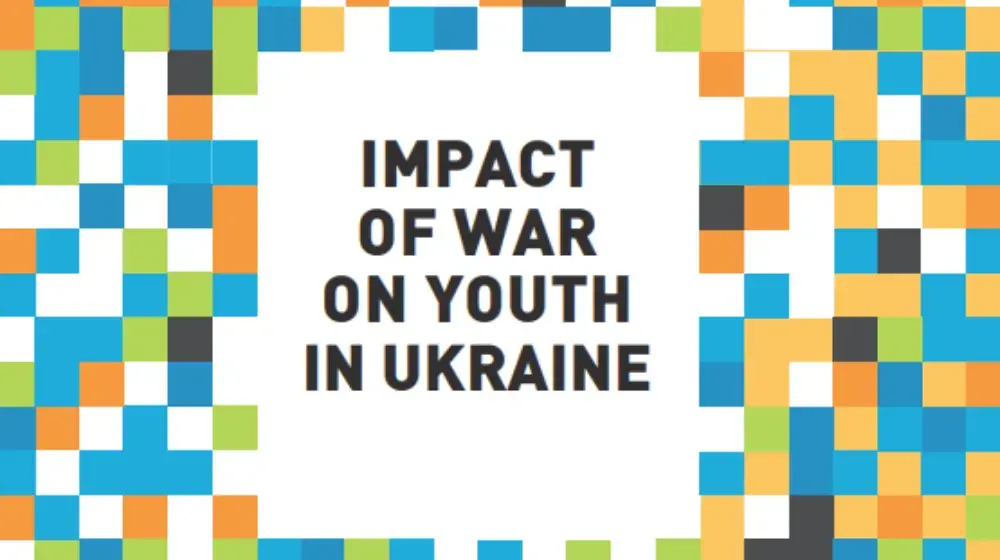In Ukraine, there are six and a half million young people (aged 10 to 24), or one sixth of the total population, who will soon begin defining the future of the entire country. Young people make decisions that affect both their own well-being and that of their families, communities and of the entire nation. Societies that are focused on engagement of young people have more opportunities to thrive, while risks arising from the exclusion of young people from public life entail depopulation, stifled economic growth, deteriorating security situation, and disturbance of public peace. Therefore, all components of young people's well-being — education, employment, health, affordable housing, support for young families with children, social inclusion, security and law and order (according to the priorities reported by young respondents in the survey “Post-2015 Ukraine: The Future We Want”) — must be at the core of development policies and programs at all levels, and encourage investment in young people. As political and investment decisions in Ukraine become increasingly evidence-based, the country lacks data about the development and well-being of young people, and the available data are mainly scattered and inconsistent. Even when data are available, they are not analysed so as to create a cohesive image of how well young people live, to reflect their needs, wishes, expectations and orientation.
In fact, young people’s well-being and the way they perceive their own value to their families, communities and country, are some of the factors determining whether young people will stay where they live or look for better chances elsewhere. Therefore, without a deep understanding of those complex factors and without a consistent and constructive dialogue with young people, it would not be possible to build a happy and prosperous community, city or country where girls and boys are able to reach their full potential, freely express themselves, enjoy respect for their views, and live in dignity, without poverty, discrimination and violence.
One of the gravest problems of youth policy and programme work is the lack of a framework approach that is evidence-based combination of theory and practice. Young age is a period of significant physical, mental and emotional transformations, but quantitative and comparative evaluations of young people’s growth, development and well-being are not fully available. To address this gap in data, international researchers have initiated calculating indicators to evaluate well-being and development of young people. At the international level, the most prominent tools of that kind are the Global Youth Development Index and the Global Youth Wellbeing Index, which collect and analyse data on dozens of youth-related indicators in such areas as education, health, employment and economic opportunities, political and social participation, access to information and communication technologies, security and order.
While these indicators are well suited for global analysis, international comparisons and monitoring of progress at national level, the proposed methodology can be further developed into a practical planning and tracking tool at the local level. The availability of such an instrument will be of particular importance to Ukraine, where decentralization reform is taking place and municipalities are developing and implementing their local youth policies and programs. Tracking local progress on youth indicators provides a more informed policy-making process, encourages greater attention to results, intensifies efforts for a more transparent and accountable youth policy decision-making process, illuminates arguments on budgetary priorities and promotes governance results.
To determine the Municipal Youth Well-Being Index for Ukraine (YWBI), the authors of the methodology proceeded from an analysis of the world experience of identifying the most important aspects of life and well-being of youth, youth development trends, methods of youth well-being, as well as their own assessment of available data on various aspects at the municipal level. As a result of this work, the authors identified 49 primary indicators, which are grouped by 7 important blocks:
- Education
- Health
- Economic opportunities
- Participation in political life
- Participation in public life
- Information and communication technologies
- Security and order
The methodology for calculating the YWBI is the same for all cities, which allows comparing indexes between cities.
For whom?
For local authorities. YWBI is a simple tool for monitoring and assessing the well-being of young people in a specific city. YWBI already have been conducted in Bakhmut, Kremenchuk, Ivano-Frankivsk, Mariupol, Nizhyn, Poltava, Chernivtsy, Vinnytsia, Kyiv, Kovel, Lutsk, Melitopol, Nova Odesa, Smila, Kherson, Dnipro, Lviv, Mykolaiv, Odesa, Ternopil, Khmelnytskyi, Fastiv. Any city can use the developed methodology and platform for polls. Contact us for this!
For youth. It is a convenient opportunity to engage in dialogue with the authorities, provide feedback, and participate in the decision-making process at the city level.
For the media and NGOs in cities. Index data assesses the success of the city's youth policy.
For local business. The platform, where young people are interviewed by YWBI, has the ability to post promo codes from local companies. That is, each participant receives discounts on goods or services in their city after completing the survey. By becoming a partner of the City's Youth Well-Being Index, a local company has the opportunity to provide discounts on their services or products, and in return receive potential buyers.
2022 year results
In 2022, due to a full-scale invasion and war in Ukraine, it was decided not to conduct the new cycle of YWBI surveys among young people. Only the city of Kremenchuk was able to continue the survey in August 2022, resulting in engaging of 800 respondents among young people of Kremenchuk.
Meanwhile, the expanded functionality of the new Youth Well-Being platform allowed partner municipalities to conduct other sociological surveys to determine the changed priorities areas of investment in youth development in the context of ongoing war and humanitarian response. Online survey on the needs of young people (including internally displaced persons) in the Chernivtsi urban territorial community was conducted with participation of a total of 719 respondents.
2021 year results
In 2021, 10 new municipalities joined the YWBI project (Chernivtsi, Nova Odesa, Poltava, Khmelnytskyi, Kovel, Nizhyn, Ivano-Frankivsk, Fastiv, Smila, Vinnytsia).
In total, during 2021, 18 Ukrainian cities conducted the Youth Well-Being Index survey in their communities and started to actively cooperate with local youth and government (all the above cities, as well as Odesa, Kyiv, Kremenchuk, Lviv, Mariupol, Ternopil, Kherson, Melitopol, which have joined the project earlier and are conducting a survey for the second or third year in a row in order to monitor the situation and adapt their youth policy programs to current challenges). The survey engaged nearly 5000 youth respondents in total. Partnerships with 94 local business companies have been reached to support the YWBI in new municipalities.
Thanks to the partnership with SoftServe, a completely new unified online platform has been developed for the Youth Well-Being Index project. Also, a section for «Bank of Ideas» project was added to the platform, where young people can take a free online course on grant writing, apply for a grant for their own project regarding 7 main areas of the YWBI, and receive funding.
2020 year results
During 2020 6 cities started evaluating youth well-being: Mariupol, Melitopol, Kherson, Dnipro, Ternopil and Lutsk.
Success stories of municipalities
Kremenchuk
Kremenchuk was the first city in Ukraine to pilot the Youth Well-Being Index in 2017, and then conducted surveys in 2019, 2021 and 2022. According to the results of YWBI, the «Safety and security» sub-index was the lowest - 0.59 in 2017, 0.3 in 2019 and 0.36 in 2021. The fact that young people do not feel safe on the city streets and near educational institutions, became the reason to launch the «Safe City" social project, which won the «All-Ukrainian Public Budget» and received 13 million UAH from the state for the installation of 800 video surveillance cameras and lighting of streets, so that young people feel comfortable and safe at dark time of the day.
Lviv
Lviv joined the YWBI in 2019 with the support of the municipal youth space MoloDvizhCentr.Lviv and received a result 0.71 out of a possible 1. According to the results of each of the sub-indices, the discussions with representatives of specialized departments of the city council, sociologists, representatives of UNFPA, as well as the public sector were held. As a result, the city's youth annual strategy and work plan were developed based on YWBI data. Based on the results of YWBI 2021, the «Bank of Ideas» initiative was launched, and 7 youth-led projects (according to 7 sub-indexes) received mini-grants in the areas of digital literacy, healthy lifestyle, prevention of violence, ecological living, and art therapy for youth with disabilities.
Interested in a project? Join!
- If you are a city representative and would like to deploy a platform and evaluate the Youth Well-Being Index in your city, please contact us. Just email us with the note «Youth Well-being Index» at: ukraine.office@unfpa.org!
- If you are a business representative and your business is affiliated in the cities where the Youth WelL-Being Index was launched and you want to become a partner, then you can contact directly the City Council or write to us with the note «Youth Well_being Index» by email: ukraine.office@unfpa.org. We will get you in touch with a responsible person in your city.
- If you are an active young person and want your city's well-being assessed and to become a decision-maker then email us with the Youth Ambassador note to mail: ukraine.office@unfpa.org and we tell you about the next steps!






